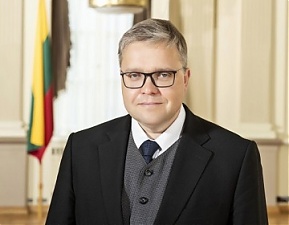‘Since its launch 20 years ago, the euro has already become the world’s second most important currency after the US dollar, yet being in the runner-up position does not mean that euro usage has reached its limits. Increased international role of the euro is not only feasible but also necessary to the EU economy and residents,’ said Vitas Vasiliauskas, Chairman of the Board of the Bank of Lithuania.
According to Vasiliauskas, wider global use of the euro would mean that Europe’s economic and financial system is strong and resilient, and financial markets are deep and liquid. Furthermore, this would create favourable conditions to increase the EU’s economic competitiveness and lead to a reduction of international trade costs, arising from currency exchange and exchange rate fluctuations.
Above all, the international popularity of the Europe’s single currency is driven by market processes; however, according to the Chairman of the Board of the Bank of Lithuania, policymakers are in a position to establish conditions favorable to a more active international role of the euro. To accomplish this, it is crucial to adhere to our shared commitments to deepen the EU integration. The first step towards achieving this goal would be to implement measures devised to further strengthen the Economic and Monetary Union, such as establishment of the EU Capital Markets Union or completion of the Banking Union.
Vasiliauskas stressed the need to break the stalemate on the European Deposit Insurance Scheme, which would strengthen the trust of market participants in the EU financial sector and single currency. The development of a European safe asset, which would provide international investors with a liquidity guarantee, is of particular importance as well.
‘Such key issues as the European Deposit Insurance Scheme or a common EU safe asset cannot be simply shelved. With the new European Commission (EC) taking office, we must continue high-level political discussions and make key decisions which would allow us to take steps towards achieving tangible results. A successful and balanced development and resilience in the face of external challenges is hardly possible without a further integration of the EU,’ said Vitas Vasiliauskas.
Today, the euro is the currency of 19 EU countries and over 340 million Europeans. Launched on 1 January 1999, it was initially an electronic currency used by financial markets and for cashless payments. Three years later, euro banknotes and coins entered into circulation. Lithuania adopted the euro on 1 January 2015.
The initiative to strengthen the international role of the euro was launched at the end of 2018 with the EC Communication ‘Towards a stronger international role of the euro’. This gave rise to political discussions, consultations with market participants, etc. Boosting the international role of the euro is expected to feature prominently in the new EC agenda as well.
Held twice a year, the Eurofi Financial Forum is attended by more than 900 participants, including representatives from the EU central banks, public authorities, international organisations as well as business and financial sector experts. This high-level event is viewed as one of the most important economic and financial policy forums in Europe.
The discussion on strengthening the international role of the euro will also be attended by François Villeroy de Galhau, Governor of Banque de France, and other high-level representatives from financial institutions and international organisations.
 Print version
Print version








 «The Baltic Course» Is Sold and Stays in Business!
«The Baltic Course» Is Sold and Stays in Business!

